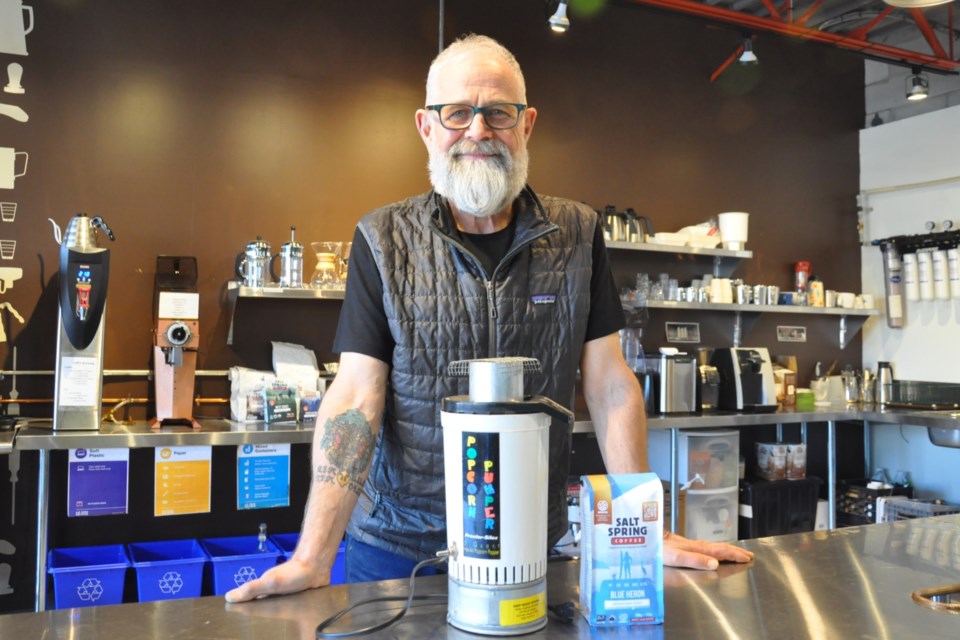As more coffee brands are going organic, a Richmond-based coffee company is taking sustainability a step further.
Salt Spring Coffee, which was founded on the eponymous island in 1996 but has operated in north Richmond since 2010, announced last month it will be offering Regenerative Organic Certified (ROC) coffee, possibly the first regenerative coffee brand in sa国际传媒.
While organic farming centres largely around what farmers can’t do, including not using chemicals, regenerative agriculture puts more requirements on what farmers do for the soil, with a focus on soil health.
“The soil gets tested for micro-organisms and all healthy bacteria in the soil.... if you do the crop properly, then you can actually help mitigate carbon, so it pulls carbon out of the air back into the soil,” said Mickey McLeod, co-founder and CEO of Salt Spring Coffee.
The company has worked with farm suppliers to become regenerative-organic and has recently expanded to the U.S. market with its new brand. McLeod said they will gradually transition all their products in the Canadian market to be regenerative coffee.
The coffee company has always focused on sustainability, McLeod said, largely producing organic coffee.
"Now we're taking it to another level getting into regenerative agriculture,” he added.
McLeod said the company is making this transition because it’s the right thing to do.
“It does cost a bit more - not tremendously more, but it does take more work. But if you treat your body well, you eat well and you respect the earth better, then to me that's actually cheaper,” he said.
However, it isn't necessarily easy, especially during more difficult economic times.
"When you have a company that cares about what you do, and then you're still trying to be fiscally responsible, it's not always an easy road to be on,” McLeod said.
Journey from the island to Richmond
Many people probably don’t know that Salt Spring coffee is actually roasted in Richmond.
More than 20 years ago, McLeod owned a sawmill business at the time. But as coffee lovers, he and his wife Robbyn started roasting coffee at home on Salt Spring Island using a small roaster. They then started sharing their coffee and opened the first roasting café on the island offering organic, fair-trade coffee.
At that time, specialty coffee was just starting to gain momentum and they were often asked the question, “why organic?” McLeod recalled. But they never gave up raising awareness about its importance.
The coffee shop boomed on the island and grew rapidly so that the home roaster was not practical anymore. They then moved to a commercial property on the island but very soon the business needed to expand.
“On Salt Spring, there's not a lot of commercial places or industrial places to go. We were kind of forced to leave,” said McLeod, who started looking for facilities all around the Metro Vancouver area.
“It ended up the [Richmond] facility chose us because it was what was available. It was good because it's close to the airport, the ferry, Vancouver, bus routes," he said. "[The government] has been very supportive of us being here.”
McLeod even rented a property to house all the employees from Salt Spring Island for a while, until they left and were replaced by local staff. He himself now commutes between the island, where the family still runs the café, and the Richmond facility.
The company now has around 25 employees who roast about two million pounds of green coffee a year, selling it across sa国际传媒 and to some markets in the U.S.
It was awarded Green Business of the Year by the Richmond Chamber of Commerce last year.
“We will continue what we do and try to get better and be more efficient, growing the [regenerative organic coffee] market in the U.S., and transferring into sa国际传媒. That’s the plan,” said McLeod.
Got an opinion on this story or any others in Richmond? or email your thoughts or story tips to [email protected].



